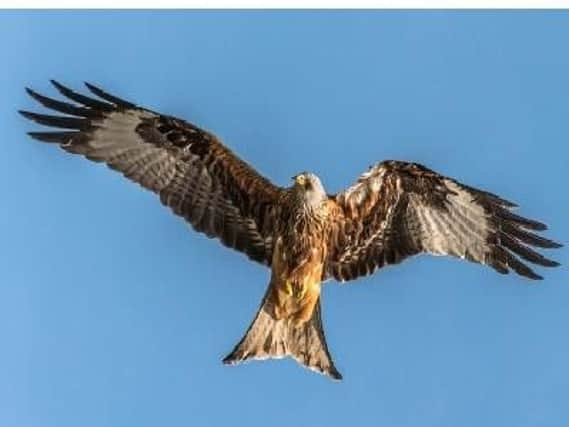Red kite died after being poisoned by 'highly toxic' pesticides


The bird was found by a member of the public near Pateley Bridge in North Yorkshire close to a caravan site.
After an examination to rule out obvious causes of death, North Yorkshire Police sent the bird to the Wildlife Incident Investigation (WIIS) for analysis.
Advertisement
Hide AdAdvertisement
Hide AdFurther tests have now revealed the presence of two pesticides and concluded that this was most likely the cause of the bird’s death, particularly given it was fit and healthy and had died soon after eating a large meal.
Two pesticides (Bendiocarb and Isofenphos) were present in the bird’s stomach, along with the remains of what it had eaten.
Bendiocarb is licensed for use as a pesticide in England, but Isofenphos is banned in the UK. Both pesticides are highly toxic and their use has previously been identified as the likely cause of death of other red kites in North Yorkshire.
A North Yorkshire Police spokesman said: "Despite extensive investigations, police have not been able to find evidence to understand how the pesticides reached the red kite or to identify those responsible for misusing these toxic substances. Although the investigation has now concluded, anyone with information is asked to contact us.
Advertisement
Hide AdAdvertisement
Hide Ad"In the course of normal use, pesticides like Bendiocarb should never be released into the environment where wildlife, such as birds of prey, can be exposed to them.
"Police are aware that poisons and pesticides like Bendiocarb or Isofenphos can be laid on bait, for example a carcass of a rabbit or bird so we would urge dog walkers to be vigilant and do not let your pets eat or investigate any animal carcasses they might come across when out walking. If you find any evidence of bait like this or a poisoned animal, then do not touch it. Many chemicals are extremely toxic and can be absorbed through skin."
Red kites have been successfully re-introduced to Yorkshire, having been extinct as a breeding bird in England, and they are now a familiar sight to people in Nidderdale.
All birds are protected by law and it is a crime to intentionally kill, injure, or take any wild bird. If anybody has information about persecution of birds of prey please call North Yorkshire Police on 101.